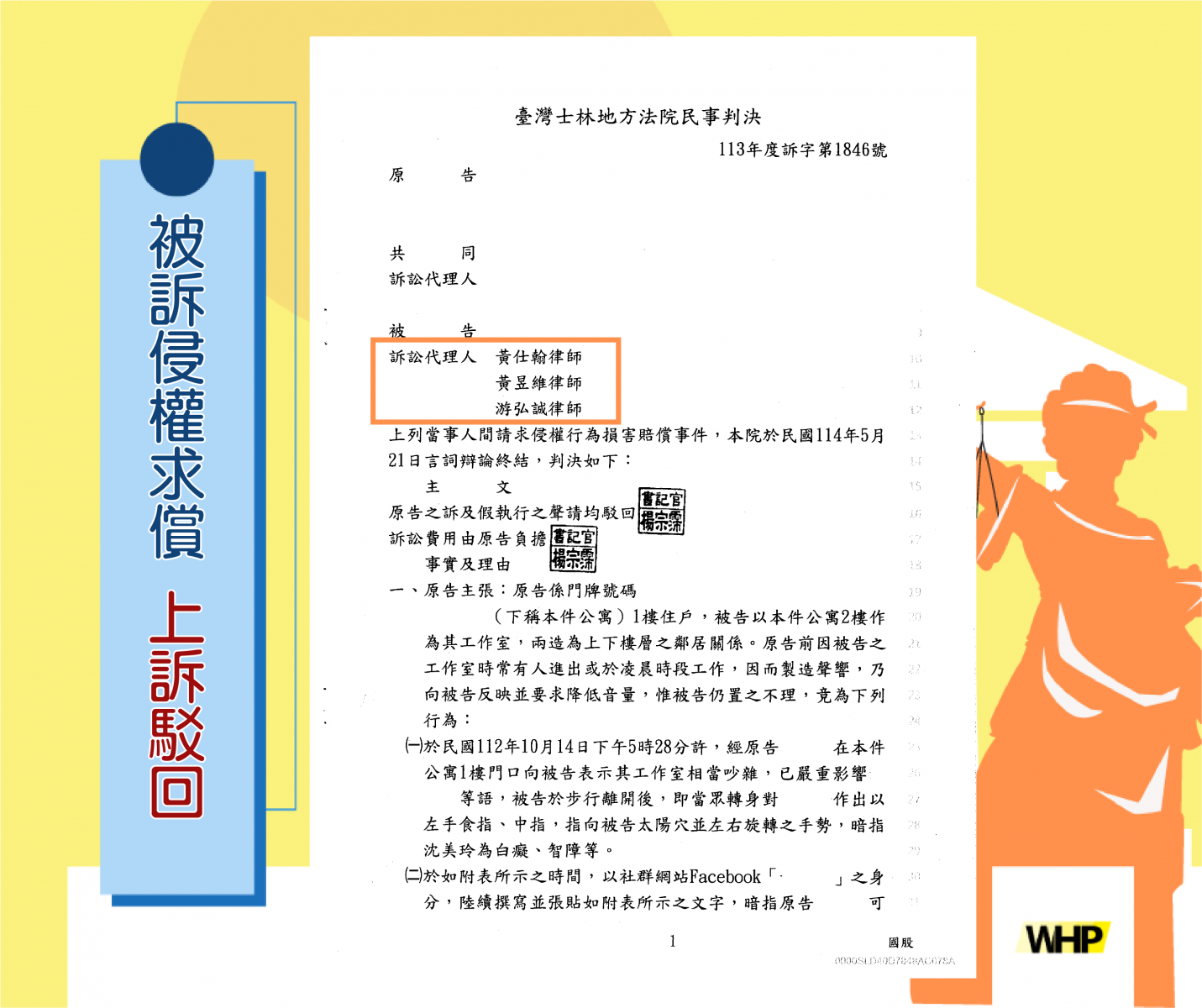首頁 >
| Civil Case | Hand Gesture and Social Media Posts Allegedly Constituted Public Insult?

Relevant Legal Provisions
Article 184, Paragraph 1 of the Civil Code:A person who, intentionally or negligently, unlawfully infringes upon the rights of another shall be liable for damages. The same shall apply to a person who intentionally causes harm to another in a manner contrary to public morals.
Article 195, Paragraph 1 of the Civil Code:A person who unlawfully infringes upon the body, health, reputation, liberty, credit, privacy, or chastity of another, or who unlawfully infringes upon other personality interests in a serious manner, shall be liable to pay an appropriate amount of compensation, even if the victim has suffered no pecuniary loss. A person whose reputation has been infringed may also demand appropriate measures for the restoration of reputation.
Facts and Reasons
An apartment located in Taipei City is at the center of a dispute. The plaintiff resides on the first floor of the building, while the defendant (our client) operates a studio on the second floor.
The plaintiff claims that the defendants studio frequently has people coming and going, and sometimes even operates during late-night hours. These activities allegedly generate noise that seriously disturbs the peace and quiet of the first-floor residence. The plaintiff states that they have previously raised these noise concerns with the defendant and requested that she lower the volume, but claims that the defendant ignored these requests.
As tensions escalated, one afternoon the plaintiff encountered the defendant and one of her friends at the entrance of the building. The plaintiff once again brought up the issue of the studio’s noise, asserting that it had significantly disrupted their daily life. According to the plaintiff, after walking away, the defendant turned around in public and made a gesture using her left index and middle fingers pointed at her temple, rotating them side to side — a motion the plaintiff interpreted as implying that they were an "idiot" or "mentally disabled," and thus considered insulting.
However, in reality, the defendant had turned to speak with her accompanying friend, and the gesture was a private, inside action between friends, not intended toward the plaintiff. This misunderstanding led to further conflict.
Subsequently, the defendant posted several entries on the social media platform Facebook. The plaintiff believes that these posts also defamed their reputation. Based on the above events, the plaintiff claims that the defendant caused damage to their reputation and is seeking a large sum in compensation.
Judgment
The plaintiff's claims and the request for provisional execution were both dismissed.
According to this Court’s examination of the surveillance footage submitted by the plaintiff, it is shown that the defendant and her two accompanying friends were walking away toward the lower right section of the footage (i.e., down the street), indicating that at the time the defendant made the gesture in question, she and her friends had already left the scene — specifically, the front entrance of the apartment building. The conversation between the defendant, her friends, and the plaintiff had already concluded. Furthermore, the footage shows that the defendant turned slightly to face her friend behind her just before making the gesture, and continued walking alongside that friend afterward. Considering her movements, walking direction, and the context before and after the gesture, it is reasonable to conclude that the gesture was directed at her friend walking behind her, not at the plaintiff, who had already returned inside the apartment.
Therefore, the defendant’s explanation — that the gesture was not directed at the plaintiff but was a private interaction with her friend, and that it did not harm the plaintiff’s reputation — is not unfounded.
As for the defendants act of writing and posting the messages in question, while a civil infringement of reputation under the Civil Code is not identical to criminal defamation under the Criminal Code, whether one’s reputation has been harmed should be judged based on whether their standing in society has been objectively diminished. Upon examining the content and tone of the defendant’s posts — taking into account the manner of expression, the context, and the surrounding circumstances — and weighing the matter under the principle of proportionality, the posts do not objectively constitute unlawful behavior. As such, they do not amount to a tortious infringement of the plaintiff’s right to reputation.
(Note: To protect the client's interests, certain case details and judgment images have been redacted and modified. For a full review of the case, please refer to Judicial Yuan's judgment database)
Attorneys:Vincent Huang、Webber Huang、Kevin Yu
-
11.25 2025
Criminal | Forgery of Documents, etc. Successfully...
-
11.18 2025
Civil Case | Defendant’s Claim for Damages Success...
-
11.11 2025
Criminal | Violation of Anti-Money Laundering Act,...
-
10.28 2025
Criminal Case | Defendant Acquitted of Hit-and-Run...
-
10.21 2025
Criminal Case | Defendant Charged with Forgery Acq...
-
10.14 2025
Assisted in the Division of Co-owned Property and ...
-
09.30 2025
Defendant – Offenses Against Sexual Autonomy Appea...
-
09.23 2025
Criminal | Defendant Charged with Embezzlement in ...
-
09.16 2025
Criminal | Case of Infringement of Sexual Privacy ...
-
09.09 2025
Request for Ownership Transfer Registration – Plai...
-
09.02 2025
Civil | Joint Construction Dispute Requesting Perf...
-
08.26 2025
Criminal | Defendant Charged with Aggravated Fraud...
-
08.19 2025
Internal Company Dispute Defendant Forged Document...
-
08.12 2025
Civil Case | Check Dishonored – Claim for Loan Rep...
-
08.05 2025
Heavy Motorcycle Rear-End Collision, Lawsuit for N...